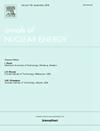基于增益调度线性自抗扰控制的小型压水堆功率调节
IF 1.9
3区 工程技术
Q1 NUCLEAR SCIENCE & TECHNOLOGY
引用次数: 0
摘要
小型压水堆采用整体式设计,具有结构简单、体积小、安全性高等优点。然而,SPWR是一个非线性、时变的复杂动力学系统。传统的电力控制系统在大负荷、突变负荷调节下存在超调量大的问题。为了解决这一问题,提出了一种增益调度的线性自抗扰电抗器控制方法。在该控制方案中,功率偏差由线性自抗扰控制器处理,冷却液温度偏差由PI控制器传递,两者共同调节控制棒。从而使功率能够快速适应负载的变化,同时使温度偏差能够满足控制要求。通过线性插值法将遗传算法优化后的控制器参数表示为函数,形成离线数据库。通过实时查询离线数据库,得到控制系统的最优参数。在强制循环和自然循环两种典型工况下进行了模拟试验。结果表明,与传统控制系统相比,所设计的控制系统可以有效地减少功率超调和沉降时间。本文章由计算机程序翻译,如有差异,请以英文原文为准。
Reactor power regulation of a small pressurized water reactor based on linear active disturbance rejection control with gain scheduling
The small pressurized water reactor (SPWR) adopts the integral design, which has the advantages of simple structure, small volume and high safety. However, SPWR is a system with nonlinear and time-varying complex dynamics. Under large and abrupt load regulation, the traditional power control system has the problem of large overshoot. To solve this problem, a linear active disturbance rejection reactor control with gain scheduling is proposed. In this control scheme, the power deviation is handled by linear active disturbance rejection controller and the coolant temperature deviation is passed by PI controller, which jointly adjust the control rod. Thus, the power can quickly adapt to the load change while the temperature deviation can meet the control requirements. The controller parameters optimized by genetic algorithm under different power levels are expressed as a function by linear interpolation method to form an offline database. The optimal parameter of the control system is obtained by querying the offline database in real time. Simulation tests are carried out in the typical conditions of forced circulation and natural circulation. The results show that under the designed control system the power overshoot and settling time can be effectively reduced compared with the traditional control system.
求助全文
通过发布文献求助,成功后即可免费获取论文全文。
去求助
来源期刊

Annals of Nuclear Energy
工程技术-核科学技术
CiteScore
4.30
自引率
21.10%
发文量
632
审稿时长
7.3 months
期刊介绍:
Annals of Nuclear Energy provides an international medium for the communication of original research, ideas and developments in all areas of the field of nuclear energy science and technology. Its scope embraces nuclear fuel reserves, fuel cycles and cost, materials, processing, system and component technology (fission only), design and optimization, direct conversion of nuclear energy sources, environmental control, reactor physics, heat transfer and fluid dynamics, structural analysis, fuel management, future developments, nuclear fuel and safety, nuclear aerosol, neutron physics, computer technology (both software and hardware), risk assessment, radioactive waste disposal and reactor thermal hydraulics. Papers submitted to Annals need to demonstrate a clear link to nuclear power generation/nuclear engineering. Papers which deal with pure nuclear physics, pure health physics, imaging, or attenuation and shielding properties of concretes and various geological materials are not within the scope of the journal. Also, papers that deal with policy or economics are not within the scope of the journal.
 求助内容:
求助内容: 应助结果提醒方式:
应助结果提醒方式:


